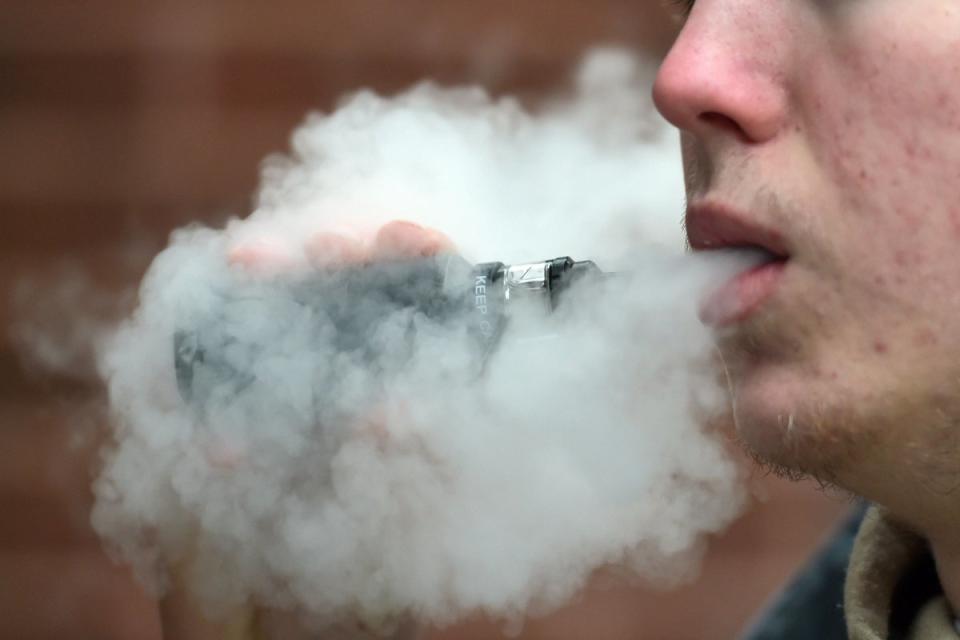Are vapes going to be banned in the UK? The government's new plans explained

Vapes will not be allowed to be marketed in a way that appeals to children and teenagers, Labour has announced, as part of plans to protect them from vaping and tobacco.
In the King’s Speech on Wednesday Charles set out Labour’s plans for housing, railways and health, including a Bill to make smoking in all forms harder. There will be limits imposed on the sale and marketing of vapes, so they do not appear as attractive to young people. Another Bill will be introduced to try to stop people smoking cigarettes.
Speaking at the opening of parliament, King Charles said: “A Bill will be introduced to progressively increase the age at which people can buy cigarettes and impose limits on the sale and marketing of vapes. My ministers will also legislate to restrict advertising of junk food to children along with the sale of high caffeine energy drinks to children.”
Data shows the number of children vaping in the past three years has tripled, the former Government said at the start of the year, adding that use among younger children is also rising, with nine per cent of 11 to 15-year-olds now using vapes. Usage has increased ninefold among older teens.
The previous Conservative-led government did a consultation on smoking and vaping, which found a worrying number of young people were open to vaping. Last year it announced an attempt to create a “smoke-free generation” by banning the sale of cigarettes to anyone born on or after January 1, 2009, which has been revived by Labour.
Rishi Sunak, then the prime minister, said: “As any parent or teacher knows, one of the most worrying trends at the moment is the rise in vaping among children, and so we must act before it becomes endemic.
“The long-term impacts of vaping are unknown and the nicotine within them can be highly addictive, so while vaping can be a useful tool to help smokers quit, marketing vapes to children is not acceptable."
But others have criticised the move, saying disposable vapes are a tool to help people give up smoking cigarettes. Last year, one charity warned that a ban on single-use products might flood the market with illegal products.
But how will the ban work and what could it mean? Here are the details as we know them so far.

Why does the Government want to ban disposable vapes?
The move to ban colourful disposable vapes comes after criticism from health experts and paediatricians.
The Royal College of Paediatrics and Child Health wants a ban on disposable vapes and has warned “youth vaping is fast becoming an epidemic among children”. It called for urgent action to protect youngsters, saying experts agreed that longer-term data is needed on the effects of vaping.
In September, figures from the Office for National Statistics showed a large increase in vaping among teenagers and young adults in Britain.
NHS figures also showed a rise in the number of children admitted to hospital due to vaping.
Forty children and young people were admitted to hospital in England in 2022 because of “vaping-related disorders”, which included lung damage or worsening asthma symptoms, up from 11 two years earlier, the NHS said.
England’s chief medical officer, Professor Sir Chris Whitty, has said previously: “If you smoke, vaping is much safer; if you don’t smoke, don’t vape; marketing vapes to children is utterly unacceptable.”
There have also been calls for disposable vapes to be banned to protect the environment. According to Material Focus, five million disposable vapes are thrown away every week, which are toxic and can be damaging to the environment and wildlife if littered.
More than seven million single-use vapes were bought every week in the UK in 2023 – double the amount bought in 2022, the environmental group said, but only 17 per cent of people correctly recycle their vapes in shops or recycling centres.

Who smokes and uses disposable vapes?
The proportion of young people in London who smoke has halved in more than a decade, figures have revealed.
Analysis carried out by the Standard published in September 2023 showed that 10.1 per cent of people aged between 18 and 24 regularly smoked cigarettes in 2022.
Londoners in the age group are the least likely to smoke of any region in England, according to figures released by the Office for National Statistics (ONS). Men were slightly more likely (10.7 per cent) to smoke than women (9.4 per cent).
Across all age groups, just 11.7 per cent of Londoners said they smoked cigarettes in 2022. This was lower than the national average of 12.9 per cent.
A total of 15.5 per cent of Britons aged between 16-24 identified as daily or occasional e-cigarette users in 2022, compared with 11.1 per cent the year before. This increase was particularly significant among women in the age group, with a fourfold jump in vaping rates between 2021 and 2022. The ONS did not release figures on e-cigarette use in London specifically.
The ONS figures also reveal a significant variation in smoking rates across different London boroughs, with more deprived areas having higher rates of smoking than more affluent boroughs.
What kind of vapes do people use?
Vapes have become popular because they are easy to buy and are less harmful than cigarettes, as well as because of how they are marketed and packaged. They are sold in supermarkets and in corner shops around the UK, and the packaging is brightly coloured.
They also come in flavours that entice children, such as bubblegum, strawberry lemonade, and blueberry.
Where can you vape legally?
Vaping laws are a bit of a grey area and differ drastically from those regulating smoking. At present, you must be 18 or older to buy and use a vape in the UK.
Vape cartridges – the liquid that goes in them – must not hold more than two millilitres of liquid or contain more than 20 milligrams of nicotine per millilitre.
While selling vapes to under 18s is illegal, nicotine-free products can be sold.
Vaping is allowed in the UK at present and there are no nationwide legal restrictions or laws enforced on vaping in public areas. The use of vaping devices indoors is generally permitted in the UK, unless a specific establishment or public area has imposed a ban. However, individual businesses and organisations have the discretion to implement their own policies regarding vaping on their premises.
Where in the world are vapes banned?
A number of countries around the world have already introduced bans on e-cigarettes. Here are all the countries that have imposed a ban on disposable vapes so far:
Europe
Turkey
Vatican City
At the time of writing, the UK and France have proposed the implementation of a ban on disposable vapes.
Asia
Bhutan
Brunei
Cambodia
Hong Kong
India
Iran
Iraq
Japan (vaping non-nicotine e-liquid is legal)
Kuwait
Laos
Lebanon
The states of Penang, Kedah, Johor, Kelantan in Malaysia
North Korea
Nepal
Oman
Palestine
Qatar
Singapore
Sri Lanka
Syria
Taiwan
Thailand
Timor-Leste
Turkmenistan
Africa
Ethiopia
Gambia
Ghana (unless you have a prescription)
Mauritius
Seychelles
Uganda
Oceania
Australia (unless you have a prescription)
Americas
Antigua and Barbuda
Argentina
Brazil
Mexico
Nicaragua
Panama
Suriname
Venezuela
Uruguay

 Yahoo News
Yahoo News 
